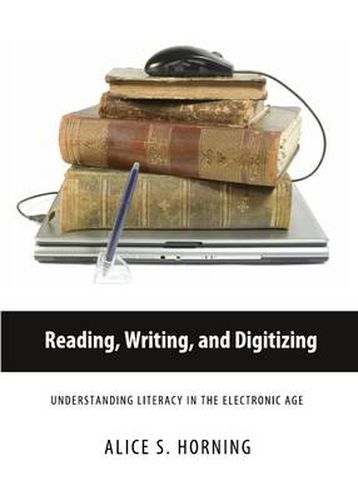Readings Newsletter
Become a Readings Member to make your shopping experience even easier.
Sign in or sign up for free!
You’re not far away from qualifying for FREE standard shipping within Australia
You’ve qualified for FREE standard shipping within Australia
The cart is loading…






Reading, Writing, and Digitizing offers a new theoretical proposal concerning expert and novice readers and writers based on the psycholinguistics of literacy. This book has five specific goals. First, it presents a theory of meta-reading and writing that describes what literacy experts are able to do with written text. They do what the word meta describes: go before and after, into and around, beyond and beside written text to understand and create meaning. Second, the case studies presented reveal differences between literacy novices and experts in terms of their awarenesses about texts and their skills; these are clarified as the discussion unfolds. Third, the book provides an analysis of the processing mechanisms people use and the features that texts contain that make literacy possible. A fourth goal is to examine how experts understand and produce texts in both traditional and digital venues. Finally, the book ends with focused strategies for instruction that will be useful to any reader working with people engaged in literacy development. Readers of this book will be better equipped to support the literacy development of others through their enhanced understanding of the psycholinguistics of reading and writing and of the differences between literacy novices and experts.
$9.00 standard shipping within Australia
FREE standard shipping within Australia for orders over $100.00
Express & International shipping calculated at checkout
Reading, Writing, and Digitizing offers a new theoretical proposal concerning expert and novice readers and writers based on the psycholinguistics of literacy. This book has five specific goals. First, it presents a theory of meta-reading and writing that describes what literacy experts are able to do with written text. They do what the word meta describes: go before and after, into and around, beyond and beside written text to understand and create meaning. Second, the case studies presented reveal differences between literacy novices and experts in terms of their awarenesses about texts and their skills; these are clarified as the discussion unfolds. Third, the book provides an analysis of the processing mechanisms people use and the features that texts contain that make literacy possible. A fourth goal is to examine how experts understand and produce texts in both traditional and digital venues. Finally, the book ends with focused strategies for instruction that will be useful to any reader working with people engaged in literacy development. Readers of this book will be better equipped to support the literacy development of others through their enhanced understanding of the psycholinguistics of reading and writing and of the differences between literacy novices and experts.